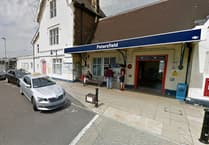I have worked in Haslemere for ten years, held down two jobs and still can’t afford to buy a house here. Waverley is England’s most expensive place (based on income/house price ratios) outside central London. Consequently, I have to commute.
Only today, young doctors cited the inability to buy homes where they work as one of the reasons for them striking for better salaries. I’m not the only one living in “housing poverty”.
Cllr Liz Townsend, Waverley’s portfolio holder for planning (last week’s paper), seeks to blame everyone but herself for Waverley Borough Council’s failure to provide enough new homes.
Consequently, WBC has lost numerous costly planning appeals and, in effect, lost control over where new development goes.
In defence of WBC’s position (they are threatened with having planning responsibilities taken away entirely by central government), the councillor contends the lack of new households being formed is evidence that fewer new houses need to be built. This is a completely distorted view.
The councillor must appreciate that fewer households are being formed because people simply cannot afford to buy new homes.
Meanwhile, according to Shelter, our biggest housing charity, millions of people are forced to live in high-rent, substandard, over-crowded accommodation, return to their parental homes, sofa surf or worse.
The councillor accuses the big developers of sitting on land banks and holding back supply to force up house prices. Considering it can take Waverley four to five years to process large planning applications (she admits, “spoiler, they always get delayed”), what company would not want a four-to-five-year supply of plots to guarantee continuity of work, for their employees and subcontractors?
When it comes to the issue of the “tilted balance”, where if a local council does not have enough allocated house sites then there is a presumption in favour of planning applications being granted at appeal, the councillor seems to be totally at sea.
She believes the existence of the tilted balance attracts speculative development. However, the “tilted balance” only comes into play when it has been proven a council does not have sufficient new homes in the pipeline. Therefore, it is incumbent on WBC, and in the interest of protecting local and neighbourhood plans, to ensure it provides sufficient new homes in the first place, when the tilted balance would never become a consideration.
Cllr Townsend doesn’t believe building more homes means lower house prices. That is naïve. Isn’t it just basic economics – demand and supply?
Prices of flats in London have not increased significantly over the past five years. They have, in fact, softened. Take the train to Waterloo, and you’ll see why – new apartments. Increased supply. Lower prices.
The councillor seems more interested in scoring points off the Conservatives (we have local elections soon) than making an honest attempt to resolve Waverley’s undoubted housing shortage.
Supposing she is interested in helping form new households and provide young doctors and the key staff we all rely on with affordable homes, wouldn’t it be better for her to engage directly with stakeholders (land owners, developers, RSLs) to iron out WBC’s supply problems? Among other things, she could sort out WBC’s planning department where, ironically, the lack of affordable homes locally means they cannot recruit staff.
She could pivot services towards small and medium-sized developers , which tend to build out their sites as soon as they secure consent. In other words, work positively with the development industry rather than blaming it for WBC’s failure.
This, of course, assumes Cllr Townsend cares about those struggling with housing needs. As it stands, there is no evidence of that at all.
Mr N Wakefield
Whyke Road, Chichester




